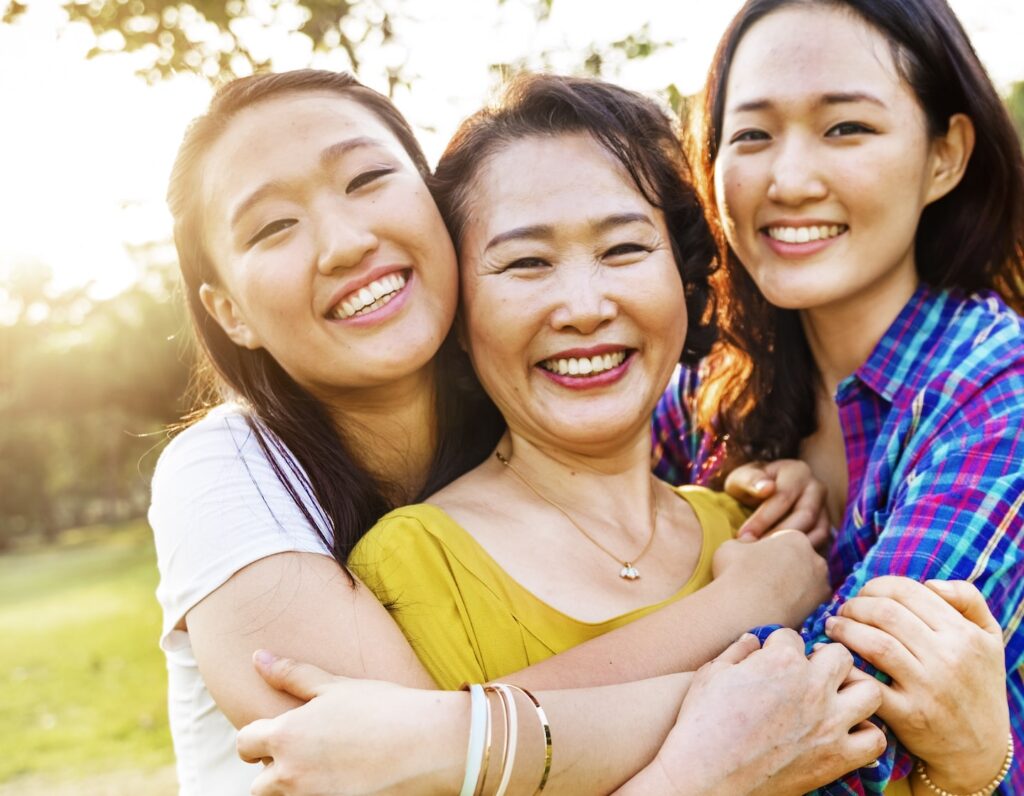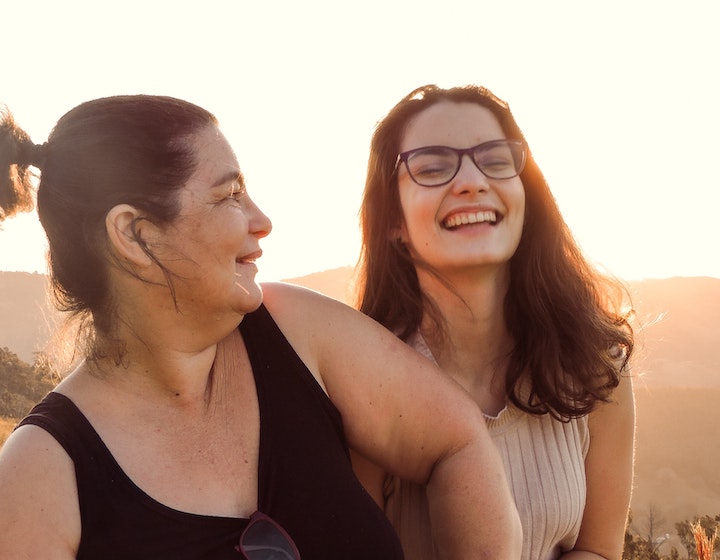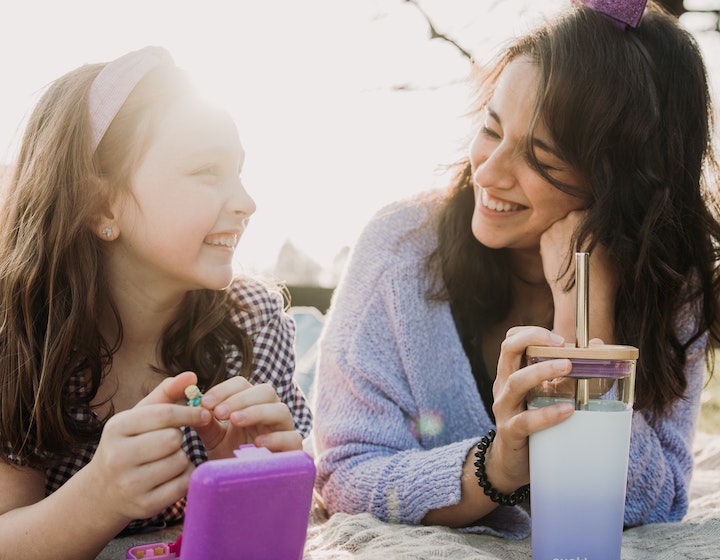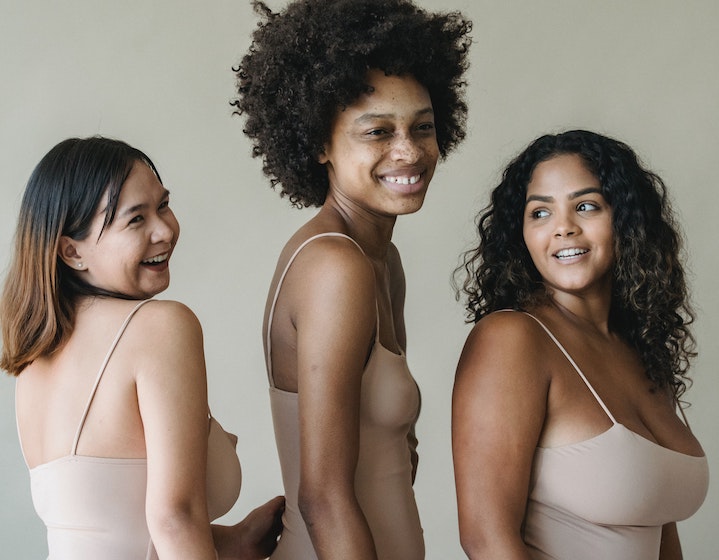
 Post Category - ParentingParenting - Post Category - 5-11 Year Olds5-11 Year Olds - Post Category - Tweens & TeensTweens & Teens
Post Category - ParentingParenting - Post Category - 5-11 Year Olds5-11 Year Olds - Post Category - Tweens & TeensTweens & Teens Post Category - Health & WellnessHealth & Wellness - Post Category - WellnessWellness
Post Category - Health & WellnessHealth & Wellness - Post Category - WellnessWellnessHow comfortable are you in your own skin Mama? Body image is a complex beast, made even more difficult when trying to support our kids through the minefield of childhood and their teenage years. Here’s some expert advice to get those conversations started.
Let’s imagine this hypothetical scenario. You’re at home, and your young daughter or son comes up to you. They’re holding back tears, and you know that something is wrong. “What happened, honey?” You ask gently. Your kid looks down, sniffles, and says, “Benny called me ‘fat’.” Your first instinct is to feel annoyed at Benny (that kid, AGAIN) and your next is to enter reassurance mode. “You’re not fat, you’re beautiful, honey!”
For most parents, the conversation stops there. After the tears are wiped and the hasty reassurance phrase is given, no more words are exchanged about the deeper issue undergirding this moment that made your child cry: the impossible expectations that they have, or are beginning to develop about food, their bodies and themselves.
Read More: Child Psychologists, Counsellors And Therapists For Children In Hong Kong

Hong Kong culture and body image
While body image and eating concerns affect young people globally,1 there seem to be two unique characteristics of Hong Kong culture that can affect how young people relate to food and their bodies. First, the impatient nature of Hong Kong society increases the appeal of fad diets and quick fixes. That is, given that our society is obsessed with speedy achievement and success, it really comes as no surprise that diet products and gym packages promising 10-pound weight drops in seven days sell so well. Second, images promoting very narrow standards are absolutely everywhere – most of our MTR stations are plastered with poster after poster of photoshopped, hairless, poreless, impossibly thin women or chiselled men.
These images have become such normalised parts of our lives that despite their potent potential for harm – that is their ability to rigidly constrain what we believe our bodies “should” look like and to spark emotions of guilt and shame when we’re unable to meet idealised appearance standards – it’s likely that few of us have ever stopped to question the messages that these images impart.
Read More: 10 Practical Tips To Improve Your Mental Health

It’s time to ask some serious questions
Parents are incredibly well-positioned to prepare young people to examine diet culture messaging with a curious and critical eye.
“There is no perfect way to start a conversation about body image, and often, the first ones we have will be awkward, uncomfortable, and difficult.”
But it is also through having these conversations that we start connecting meaningfully with each other — realising that sharing the load of our worries builds rather than breaks relationships.
Read More: How To Recognise And Prevent Sexual Abuse
So, how do you go beyond “beautiful”?
Once you get through the initial discomfort and into the territory of regular, open discussions about body image, you begin to foster a safe space for sharing. In being willing to have these candid conversations, we show our children that we’re here to hear them as they navigate their worries about food, body, and self.
Let’s explore three practical ways to get started.
Read More: Mental Health For Kids: How To Start The Conversation

 Reflect on what you believe about your body
Reflect on what you believe about your body
When it comes to starting conversations about body image with your kids, your first concern might be how your kid will react. You might wonder to yourself, “How can I make this conversation less distressing for them? What if they don’t want to open up to me?” But here, it’s important to remember that conversations are a dance – they involve introspection, preparation and engagement from both conversation partners.
In other words, it’s worth noting that your ability to reflect on your own thoughts, beliefs and behaviours surrounding your body is just as, if not more crucial than thinking ahead about how your child might respond. Practically speaking, you can prepare yourself to share how you feel about your body as a way to prompt your child to share their experiences too. You can reflect on how your own beliefs about body image — for example negative feelings you might harbour toward your body or the ways you feel you “should” be exercising or eating — might impact the ways you interpret your child’s words and how you subsequently respond to them.
Importantly, you don’t have to expect yourself to role model the ‘perfect’ relationship with food and body (it doesn’t even exist!). Instead, keep in mind that the most powerful thing you can do is to model openness, vulnerability and compassion as you engage in this conversation with your child.
Read More: Midweek Meals — Three Staple Recipes Your Teenager Can Master

 Instead of telling your kid what they “are” or “are not”, help them explore what they “can be”
Instead of telling your kid what they “are” or “are not”, help them explore what they “can be”
Remember the story about Benny that I shared at the start? Remember how the mum in that story reassured her child that they weren’t fat; that they were beautiful instead?
“Not only does this response send the message that being fat cannot also be beautiful (thus communicating narrow standards for how beauty is defined), it also effectively shuts down the conversation because it denotes what your child “should” believe about themselves.”
Another way to navigate a situation where a child comes to you with a question or concern about their bodies is to help your child explore what the experience means to them. Some helpful phrases include: “Can you tell me more about how being called ‘fat’ made you feel?” and “I hear that you felt hurt when Benny called you ‘fat’. Can you tell me more about why this comment felt hurtful?”
Read More: Where To Volunteer In Hong Kong
 Leave the door open for future conversations.
Leave the door open for future conversations.
At the end of the conversation, clearly communicate that this is a pause, rather than an end to the dialogue about body image in your household. You can do this by thanking your child for sharing their experiences and feelings with you (“Thank you for our conversation today. I really loved hearing your thoughts and feelings about this topic”). You can also end the conversation by acknowledging points of disagreement or misunderstanding and express interest in continuing to explore these points in future conversations (“I know that there were points that we didn’t completely agree on, and I appreciate you navigating this conversation with me even when it felt frustrating. Let’s continue this conversation another time – I’m excited to explore this topic with you again!”).
Read More: Raising Girls Who #BreakTheBias In Hong Kong
Discussing body image isn’t easy…
Starting a conversation about body image with your child is going to be equal parts exciting and exhausting. Moments of frustration and discomfort will inevitably arise – but so will moments of relief, empathy, and mutual understanding. Use this as a reminder to persist in paving a path for continued open dialogue with the special young humans in your life. Let it remind you that powerful conversations are always so much more about intention than they are about perfection.
Editor’s Note: Learn more about how to have empowering conversations about body image by following Steph on Instagram: @_themightymunchkin_.
Read More: Women In Sport — Why You And Your Daughter Should Get Involved
References
- Silén Y, Keski-Rahkonen A. Worldwide prevalence of DSM-5 eating disorders among young people. Current Opinion in Psychiatry. 2022;35(6):362-71.
 View All
View All











 View All
View All



 View All
View All

 View All
View All














